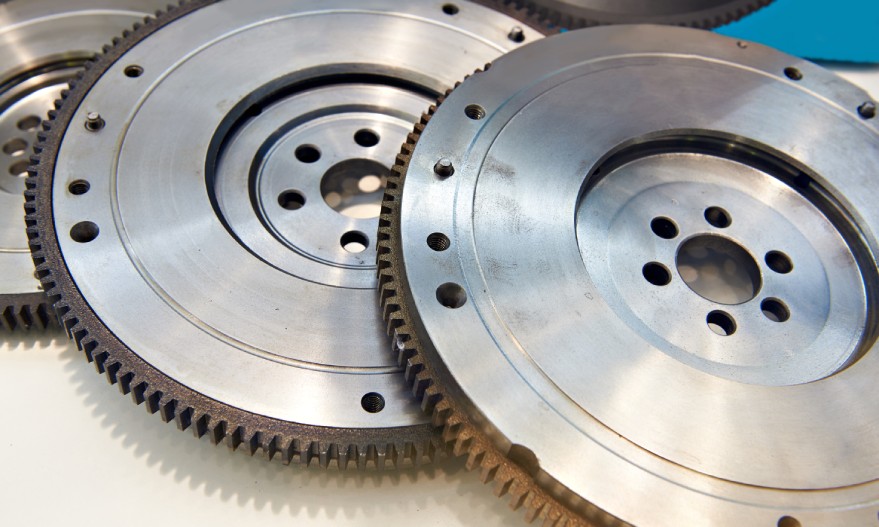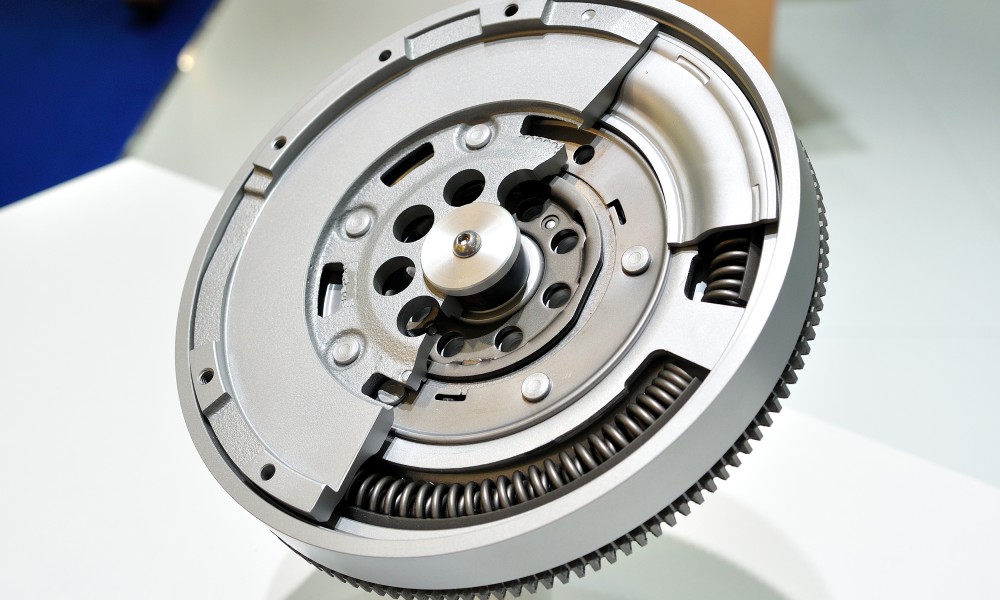How To Choose the Right Flywheel for Your Engine

Choosing a flywheel is a big decision for any professional or DIY mechanic. The flywheel is integral to engine performance, directly influencing torque delivery, drivability, and engine longevity. If you’re struggling with your decision, our guide will break down the key things to know and factors to help you choose the right flywheel for your engine.
The Importance of the Flywheel in Engine Performance
The flywheel is not merely a rotating mass attached to your engine’s crankshaft; it plays a critical role in maintaining engine momentum, smoothing out power pulses, and aiding in the transmission of torque to the drivetrain. Understanding its significance is essential for optimizing your vehicle’s performance. A compatible flywheel can enhance throttle response, reduce vibrations, and improve engine efficiency.

What Is a Flywheel, and How Does It Work?
A flywheel stores rotational energy. It works by leveraging its mass to maintain consistent engine speed, minimizing fluctuations caused by combustion.
When the engine’s pistons generate power, the flywheel absorbs some of this energy, releasing it gradually for smooth operation. This balancing act is crucial for preventing engine stalling and maintaining seamless power delivery, especially during gear changes.
Types of Flywheels
There are two primary types of flywheels to consider: single-mass and dual-mass. Each has its unique characteristics, advantages, and applications.
Single-Mass Flywheel
Single-mass flywheels (SMF), also known as lightweight flywheels, are solid metal disks that directly connect the engine to the transmission. Drivers often favor single-mass flywheels due to their simplicity, durability, and capability to handle high-performance applications.
Due to their rigid construction, SMFs can transfer more engine vibrations, which can be a drawback in daily driving but an advantage in racing scenarios requiring responsiveness.
Dual-Mass Flywheel
Dual-mass flywheels (DMFs) consist of two separate masses connected by a series of dampening springs. This configuration reduces engine vibrations and enhances smoothness, making DMFs ideal for modern vehicles focused on comfort and ease of driving. However, the DMF’s complexity and susceptibility to wear and tear make it less suitable for high-performance or racing applications.

Factors To Consider When Choosing a Flywheel
Drivers must consider various factors in order to choose the right flywheel for their engines, including the engine’s size and how they’ll use their vehicles.
Engine Type and Size
The size and type of your engine should be the foremost consideration. High-displacement engines generate a lot of torque and require a flywheel that supports increased forces.
Conversely, smaller engines can benefit from lighter flywheels, which enhance throttle response and acceleration. Engine type also matters, as a four-cylinder engine may have different flywheel requirements than a V8.
Intended Use of the Vehicle
Are you building a track-focused race car or a daily driver for daily commutes? The vehicle’s intended use should play a significant role in your flywheel selection.
For example, if you want fast acceleration and improved responsiveness, a lightweight SMF is the best option. Because of their complexity, we don’t manufacture any dual-mass flywheels here at Clutch Masters. Still, we do our best to offer options for single-mass flywheels that are similar in weight to the OEM DMF and provide similar engine rev and driving characteristics when combined with a clutch kit utilizing a dampened hub.
Material Selection
Flywheels are typically made from steel, aluminum, or billet, each offering pros and cons. Steel flywheels provide great durability and heat resistance, making them suitable for high-torque applications.
Aluminum flywheels are lighter than steel, offering quicker acceleration and improved agility. Billet flywheels, machined from a single piece of metal, provide a balance of strength and weight, catering to both performance and endurance.
Weight and Balance
The weight of the flywheel is directly proportional to its inertia. Heavy flywheels store a lot of energy, providing smooth operation at the cost of slow acceleration.
Lightweight flywheels enhance acceleration and responsiveness but may result in rough idling and increased engine vibrations. Balancing these aspects is critical for achieving the desired performance characteristics in your vehicle.
The Role of the Flywheel in Different Engine Applications
Various applications demand different flywheel characteristics. When racing, every millisecond counts—lightweight flywheels offer rapid acceleration and greater responsiveness.
For daily driving, heavy flywheels contribute to a smoother, more comfortable ride. Understanding the requirements of your vehicle’s application will guide you toward the best choice of flywheel.
Common Mistakes To Avoid When Selecting a Flywheel
While deciding on a flywheel, drivers can fall into various traps that lead them down the wrong path. Mistakes in flywheel selection can lead to suboptimal performance or even mechanical failure. Avoid these common pitfalls:
Ignoring Engine Specifications
Always align your flywheel choice with your engine’s requirements, such as its torque and power output. Overlooking this crucial step can lead to incompatible components, reduced performance, increased wear and tear, and potential damage to the engine over time. Proper alignment supports the efficiency and longevity of your engine system.
Neglecting Material Considerations
The material of the flywheel significantly impacts its performance characteristics. For example, lightweight materials like aluminum can enhance acceleration and responsiveness, making them ideal for high-performance or racing applications.
On the other hand, heavy materials such as cast iron provide better inertia and are more suitable for everyday driving with smoother power delivery. Choose a material that matches your driving style and engine demands to achieve the best performance results.
Overstressing Weight Reduction
Too often, racing and performance-focused drivers become absorbed on lightening their vehicles as much as possible. While lightweight flywheels offer great performance benefits, excessively reducing weight can compromise drivability and engine smoothness. Drivers want to strike a balance between weight and performance. The overall driving experience should remain enjoyable, and the engine should operate without excessive vibrations or instability.
Ignoring Professional Advice
Consulting industry experts or working with a trusted supplier like Clutch Masters Industries can provide invaluable insights and prevent costly mistakes. With decades of experience, we are professionals in helping you choose the correct flywheel for your application. We possess extensive experience and knowledge, which can help you navigate complex challenges, optimize your strategies, and ensure the highest quality outcomes for your projects. Taking advantage of our expertise can help you save time and resources, avoid potential setbacks, and contribute to your long-term success.
Find High-Quality Flywheels for Your Vehicle at Clutch Masters Industries
A flywheel is a crucial investment in your vehicle’s performance and longevity. By understanding the intricacies of flywheel types, materials, and applications, you can make an informed decision that aligns with your engine’s needs and driving goals.
For high-quality flywheels that cater to a range of applications and performance needs, trust Clutch Masters Industries. Our extensive selection and expert guidance will help you find the perfect flywheel for your engine. Don’t compromise on performance! Upgrade with the best and experience the difference.


